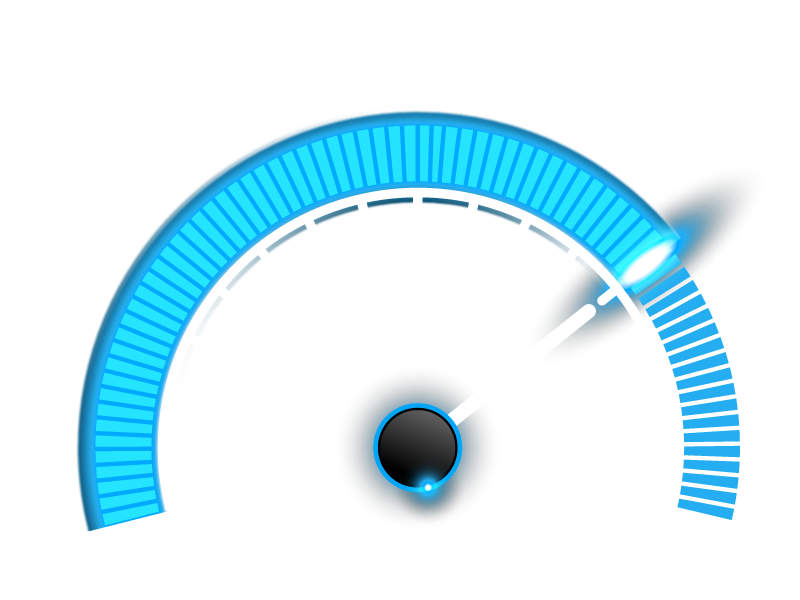Broadband
speed test

Check your broadband speed
The speed test should work in any web browser that supports Flash. You will need at least Flash 8 to use the current version of speed test. Those with a version earlier than 8 may not be able to use the application. We recommend using the most current version of Flash available. JavaScript is also used on the site so make sure you don't have it disabled.
The speed test will give you the most accurate results when you are connected to the internet via a direct Ethernet cable from your computer to your broadband router.
Connections which rely on wireless signal strength may have varying results that do not represent the full potential of your service.
For best results:
- Make sure you are connected to the internet directly via cable
- Make sure you are not downloading or uploading anything whilst carrying out the speed test
- Close any other programs that are using the internet
- Disconnect or turn off any other computers, tablets, gaming consoles or devices that are connected to your network
The ping is the reaction time of your connection-how fast you get a response after you've sent out a request. A fast ping means you have a more responsive connection, especially in applications where timing is everything (like online gaming). Ping is measured in milliseconds (ms).
The download speed is how fast you can pull data from the server to you. Most connections are designed to download much faster than they upload, since the majority of online activity, like loading web pages or streaming videos, consists of downloads. Download speed is measured in megabits per second (Mbps).
The upload speed is how fast you send data from you to others. Uploading is necessary for sending big files via email, or in using video-chat to talk to someone else online (since you have to send your video feed to them). Upload speed is measured in megabits per second (Mbps).
The results from Gibtelecom speed tests represent an estimate of the maximum connection speeds for downloading and uploading with a test server hosted within Gibraltar.
There are a number of other variables which could impact your speed test results from a third party test site. For example, when using a third party speed test site, your traffic may travel over networks that are not controlled by Gibtelecom. Those "peering" networks may have an effect on the overall speeds. In addition, the third party's test engines could be using a single threaded TCP connection during testing. This counteracts the ability to reach higher speeds, as there is more wait time from the packets being sent and received from the third party speed test server. Also, the third party site may not be using test files that are large enough to permit an accurate reading for speed tiers with higher speeds. Our speed test server is modelled to reflect normal browsing across currently available websites.
You have likely noticed that downloading from a local server location is also faster than a distant one. This is because the TCP window is not optimized for the increased latency that comes from an increase in distance. The TCP window size determines how many packets can be sent at one time. The larger the window size, the higher the speeds. Increased latency decreases the TCP window size.
Various websites cap the speeds at which consumers are permitted to download or stream content. Those websites may also become congested, which could further slow your connection to that website.
The internet has been described as a "network of networks", spanning the globe. Gibtelecom's network is interconnected with the networks of a number of third parties and Gibtelecom can only control the services on its own networks. If a third party's network is congested or has other limits on speed, you may not be able to achieve your provisioned download speeds to that specific website.
There are many variables that could impact your speed when connected to the internet through a wireless network. For example, microwaves, static electricity, fluorescent lights, windows, wall type and thickness, distance, band and signal settings, multiple devices on the same channel, and several other factors can impact the speeds you receive when wirelessly connected to the internet. These WiFi variables can add substantial delay which may result in speed degradation. A wired connection eliminates many of the potential variables of a wireless network, resulting in improved performance. Gibtelecom advises using a RJ45 CAT5E Ethernet cable to connect to your router where possible to ensure the best possible performance. This will have been provided in the box with your Broadband Gateway.
Yes, for optimal performance, place the wireless gateway or router in:
- A central location close to where online devices will most likely be used
- An elevated location, such as a higher shelf, where laptops and other devices have a line of sight view
- A vertical position
Areas to avoid include:
- Areas close to interference sources (such as microwaves, high powered appliances, cordless phones or other transmitting devices)
- Next to other wireless routers
- Next to metal objects and surfaces
- Against a wall, tucked away in a corner on the floor or behind furniture
- Near windows
- Close to halogen or florescent lighting
